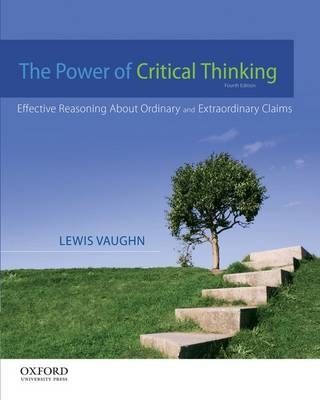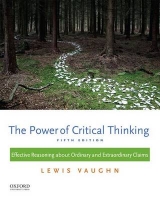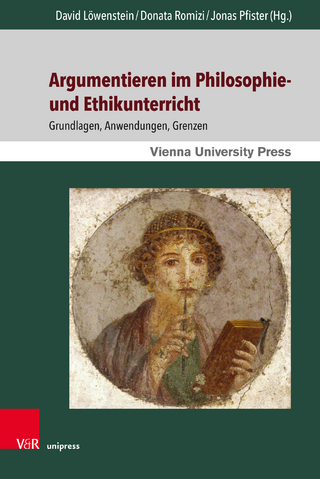
The Power of Critical Thinking
Oxford University Press Inc (Verlag)
978-0-19-985667-1 (ISBN)
- Titel ist leider vergriffen;
keine Neuauflage - Artikel merken
Lewis Vaughn is the author or coauthor of several books, including Philosophy Here and Now: Powerful Ideas in Everyday Life (2012), Contemporary Moral Arguments, Second Edition (2012), Great Philosophical Arguments (2011), Philosophy: The Quest for Truth, Eighth Edition (2011), and The Moral Life, Fourth Edition (2010), all published by Oxford University Press.
*=New to this Edition Preface PART 1. BASICS 1. The Power of Critical Thinking Why It Matters How It Works Claims and Reasons: Reasons and Arguments: Arguments in the Rough: Key Words Summary Exercises Field Problems Self-Assessment Quiz Writing Assignments 2. Obstacles to Critical Thinking Psychological Obstacles The Almighty Self: The Power of the Group: Philosophical Obstacles Subjective Relativism: Social Relativism: Skepticism: Key Words Summary Exercises Field Problems Self-Assessment Quiz Integrative Exercises Writing Assignments 3. Making Sense of Arguments Argument Basics Judging Arguments Finding Missing Parts Argument Patterns Diagramming Arguments Assessing Long Arguments Key Words Summary Field Problems Self-Assessment Quiz Integrative Exercises Writing Assignments PART 2. REASONS 4. Reasons for Belief and Doubt When Claims Conflict Experts and Evidence Personal Experience Impairment: Expectation: Innumeracy and Probability: Fooling Ourselves Resisting Contrary Evidence: Looking for Confirming Evidence: Preferring Available Evidence: Claims in the News Inside the News: Sorting Out the News: Advertising and Persuasion Identification: Slogans: Misleading Comparisons: Weasel Words: Key Words Summary Exercises Field Problems Self-Assessment Quiz Integrative Exercises Writing Assignments 5. Fallacies and Persuaders Fallacies: Irrelevant Premises Genetic Fallacy: Composition: Division: Appeal to the Person: Equivocation: Appeal to Popularity: Appeal to Tradition: Appeal to Ignorance: Appeal to Emotion: Red Herring: Straw Man: * Two Wrongs Make a Right: Fallacies: Unacceptable Premises Begging the Question: False Dilemma: * Decision-Point Fallacy: Slippery Slope: Hasty Generalization: Faulty Analogy: * Persuaders: Rhetorical Moves * Innuendo: * Euphemisms and Dysphemisms: * Stereotyping: * Ridicule: * Rhetorical Definitions: Key Words Summary Exercises Field Problems Self-Assessment Quiz Integrative Exercises Writing Assignments PART 3. ARGUMENTS 6. Deductive Reasoning: Propositional Logic Connectives and Truth Values Conjunction: Disjunction: Negation: Conditional: Checking for Validity Simple Arguments: Tricky Arguments: Streamlined Evaluation: Key Words Summary Field Problems Self-Assessment Quiz Integrative Exercises Writing Assignments 7. Deductive Reasoning: Categorical Logic Statements and Classes Translations and Standard Form Terms: Quantifiers: Diagramming Categorical Statements Sizing Up Categorical Syllogisms Key Words Summary Field Problems Self-Assessment Quiz Integrative Exercises Writing Assignments 8. Inductive Reasoning Enumerative Induction Sample Size: Representativeness: Opinion Polls: Analogical Induction Causal Arguments Testing for Causes: Causal Confusions: Necessary and Sufficient Conditions: Key Words Summary Field Problems Self-Assessment Quiz Integrative Exercises Writing Assignments PART 4. EXPLANATIONS 9. Inference to the Best Explanation Explanations and Inference Theories and Consistency Theories and Criteria Testability: Fruitfulness: Scope: Simplicity: Conservatism: Telling Good Theories from Bad A Doomed Flight: An Amazing Cure: Key Words Summary Field Problems Self-Assessment Quiz Integrative Exercises Writing Assignments 10. Judging Scientific Theories Science and Not Science The Scientific Method Testing Scientific Theories Judging Scientific Theories Copernicus Versus Ptolemy: Evolution Versus Creationism: Science and Weird Theories Making Weird Mistakes Leaping to the Weirdest Theory: Mixing What Seems with What Is: Misunderstanding the Possibilities: Judging Weird Theories Crop Circles: Talking with the Dead: Summary Field Problems Self-Assessment Quiz Integrative Exercises Writing Assignments 11. Critical Thinking in Morality and the Law Moral Arguments Moral Premises Moral Theories Evaluating Moral Theories: Two Important Theories: * Legal Reasoning A Coherent Worldview Key Words Summary Exercises Field Problems Self-Assessment Quiz Integrative Exercises Writing Assignments Appendix A: Essays for Evaluation 1. "Death Penalty Discriminates Against Black Crime Victims," USA Today 2. "Marine Parks," Bill Daly * 3. "A Feminist Defense of Pornography," Wendy McElroy * 4. "A Defense of Homosexuality," John Corvino 5. "More Innocents Die When We Don't Have Capital Punishment," Dennis Prager * 6. "What's Wrong with Adultery?" Bonnie Steinbock * 7. "A Pat-Down Is Better than a Blow-Up," Caroline Baum 8. "The Cohabitation Epidemic," Neil Clark Warren * 9. "Not Being Vaccinated Is Not Acceptable," David Ropeik * 10. "Women and the Afghanistan Peace Process," Ann Jones 11. "A Deviance from God's Norm," Richard Land 12. "Marriage Still Evolving, as Ever," Buffalo News 13. "Slouching Toward Chimeras," Jeremy Rifkin * 14. "Fighting Islamic Extremists Who Stifle Free Speech," Ayaan Hirsi and Daniel Huff * 15. "Is Sluttishness a Feminist Statement?" Wendy Kaminer 16. "Torture: Time for Congress to End the Debate," USA Today 17. "Torture: Severe Interrogations Work," Trent Franks 18. "Freedom of Expression: Protect Student Speech--Even 'Unwise' Bong Banner," USA Today 19. "Freedom of Expression: Policy Reflects Common Sense," Kenneth W. Starr * 20. "It's Irresponsible to Spread Fear of Vaccine," USA Today 21. "Flag Amendment: Flag Needs Protection," Dianne Feinstein Appendix B: Answers to Exercises Appendix C: Answers to Self-Assessment Quizzes Appendix D: Critical Thinking and Writing Notes: Glossary: Credits: Index:
| Erscheint lt. Verlag | 31.8.2012 |
|---|---|
| Verlagsort | New York |
| Sprache | englisch |
| Gewicht | 1110 g |
| Themenwelt | Geisteswissenschaften ► Philosophie ► Logik |
| ISBN-10 | 0-19-985667-2 / 0199856672 |
| ISBN-13 | 978-0-19-985667-1 / 9780199856671 |
| Zustand | Neuware |
| Haben Sie eine Frage zum Produkt? |
aus dem Bereich



